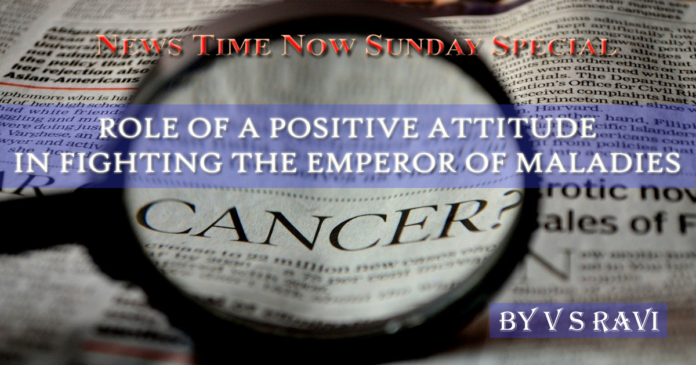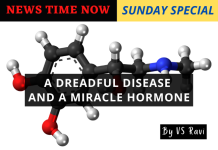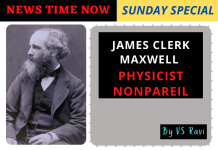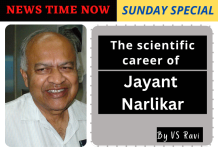The mind is its own place, and in itself Can make a Heav’n of Hell, a Hell of Heav’n.
John Milton in Paradise Lost,
I would like to start this essay with my wife’s battle with the Emperor of maladies. She was diagnosed with cancer of the rectum on February 7th, 2011, but kept it a secret from all her near and dear ones including me who she felt night be a nervous wreck on hearing the news,. So then I heard the news only when she informed her mother after a week, and as she had rightly predicted, I was mentally shattered.
She continued to attend her office (she was Manager, Trade Wings ltd.) with a smiling face. For a whole week she never discussed the problem with anyone. In fact when the surgeon told her she might have to wear a bag she joked with the surgeon asking him whether the bag came in different colours to match the colour of her sarees. The surgeon told her that in his entire career he had never come across who a patient who with a sense of humour, tinged with courage had put such a question. I agree with him. During the last ten years, I have watched with admiration and pride her courage and indefatigable spirit which contributed in no small measure in her emerging victorious, in her fight against the emperor of maladies.
Following a successful surgery on February 21st, she underwent 24 radiations and 4 sessions of painful chemotherapy. She endured the agony and discomfort of these procedures without complaining to the physicians and technicians even once. On the contrary she took pains to cheer up other patients particularly children who had come there for treatment. Her courage was admirable, and I have reason to believe that it was her positive attitude (a rare trait) rather than the treatment that enabled her to emerge victorious- an excellent example of the human mind conquering cancer.
It has long been suspected that, in a general way, the human mind can influence the state of the body. Not only scientists and doctors but also laymen are aware that if one is in a state of anxiety one loses one’s appetite. A person would not be inclined to taste even his favourite item of food placed before him, if something is troubling his mind. In fact, if such mental tension continues for a long time, it may play havoc on his digestive system producing ulcers. He may also develop blood pressure which may in turn lead to heart problems. Thus, a sick mind can destroy a healthy body. Therefore, one would be justified in thinking that there is some connection between the mind and the body, though till now scientists have not actually been able to establish a definite correlation between the mind and a specific disease such as cancer. However medical science is now for the first time unearthing some evidence to make scientists suspect that there could really be such a link.
About four or five decades ago, any suggestion that the mind could influence the growth of a tumour or cancer usually invited criticism and derisive comments from scientists who were inclined to regard such theories as totally false. However, the situation has undergone a radical transformation. Many doctors today recognise that our mental state does play a part in our ability to tackle malignant tumours. What is, however, surprising is that this has now become what may be described as a ‘respectable field of research’ one that has already yielded encouraging results if some claims made by a few researchers are to be believed.
One of the reasons for such a volte-face in the attitude of the medical community is the work of a few doctors at King’s College Hospital, London. About four decades ago, one researcher and his group made remarkable progress with a problem that is extraordinarily difficult to investigate, to say the least. One of their major discoveries came from personality tests among women who were having a lump in the breast which was established by a biopsy and other tests. Compared with the general population, more of these women listed ‘suppression of anger’ as one of their behaviour traits. This piece of evidence did seem to establish a link between emotion (i.e. the state of the mind) and cancer.
This incidentally also seemed to support the work done in Britain several years earlier by another scientist on the psychosomatic aspects of cancer. However, this scientist’s medical research council unit had been closed down after he himself had died of the disease! His investigations had yielded some suggestive evidence that cancer and the patient’s psychological conditions are closely linked. One of his most convincing studies compared smokers suffering from lung cancer with a matched group of cancer-free smokers. Personality tests showed that the cancer patients included a large proportion of those who had repressed their emotions. A subsequent study showed that lung cancer victims who smoked were less self-assertive than smokers in general.
Such findings are as surprising to non-scientists as they are to experts. There are those who have developed cancer shortly after retiring or closely following a bereavement—cases in which it has been difficult to resist the obvious conclusion of a definite emotional link. But why have the medical and scientific establishments been only too eager to dismiss such theories as ‘unscientific’.
It would seem that orthodox medical practitioners resisted evidence that the mind affects malignancies simply because they could see no scientific explanation for such an influence. What could the physiological mechanism be? Lacking even the tiniest clue, they quietly dismissed the work done by the and his colleagues and even declined to support or permit further research along these lines. On the other hand the King’s College group seems to be in a better position to appreciate the work of the British scientist mentioned above who gradually gained the sympathy of the sceintific and medical community.
A study of the behaviour immune system which not only repels invading microorganisms but probably watches for the appearance of malignant cells and combats their growth may throw some light on what goes on in the brain, and what goes on in the tissues.
A particularly stressful experience, such as the death of a husband or a wife, seems to be associated with an increased incidence of malignancy. Scientists are coming to believe that this is accompanied by a prompt and impressive decline in immune function. However, for the time being we have no absolute proof that this loss of immunity makes cancer cells begin to proliferate. Nevertheless, the correlation is sufficiently impressive to excite scientific curiosity and I provide the motivation for research.
There is another line of reasoning. Some people began to wonder whether certain psychological characteristics—depression and suppression of emotion—are the result rather than a cause of cancer. This, however, need not be taken into consideration when one is dealing with a case of bereavement. The only way to settle the issue is to conduct ‘prospective’ rather than ‘retrospective’ studies. It was felt that by assessing the personalities of many people and watching their health for years, it should be possible to identify any association between the mind and cancer. Two doctors reported virtually the only research of this sort ever carried out. After three decades of studying the health of students from prestigious Medical School, in the United States, every year from the previous three decades, students had been made to complete psychological questionnaires.
The results were striking. The personality profiles of those who later developed cancer revealed them to be persons as deliberately suppressing their emotions. Serious scientific investigation of the influence of the mind on cancer is still in its infancy.Yet there is one important practical lesson scientists have already learnt. If certain psychological states can indeed reduce our vulnerability to the disease then by the same argument perhaps we can mobilize mental resources to avoid cancer. A husband and wife team have been training patients to visualise their body defences fighting tumours. When used with orthodox treatment, the technique certainly seems to increase life expectancy. In the year 1978 two doctors reported that belief was a major factor in the spontaneous remission of cancer.
Several decades ago such claims would have been dismissed as bogus with little or any scientific value. What is impressive is that such claims are now being accepted for publication in conventional and reputed scientific journals indicating that research on a psychosomatic cause of cancer is acquiring respectability for the first time. Future sustained research in this field can alone throw light on the real scientific value of such claims. At the moment, however, what we can see is that the potential dividends seem to be impressive enough to attract the attention and excite the imagination of even conservative scientists who, otherwise would not be inclined to take seriously any theory suggesting a correlation between mind and malignant disease.
Recent research in 3 areas investigating how mental factors may influence the onset and progress of cancer has thrown light on three areas.
First, there is clear evidence from experiments with animals that stress and mental state can modulate the growth of neoplasms (an abnormal mass of tissue that forms when cells grow and divide more than they should or do not die when they should. Neoplasms may be benign or malignant) It is also becoming well established in both animals and humans that mental factors can affect the function of the immune system, a pathway through which mind may influence cancer growth.
Second, a number of prospective studies have been published to supplement the large existing literature correlating human personality factors with risk of developing the disease. It is suggested that depression and repressive tendencies are among those characteristics favoring cancer, although there is great variation in results between studies.
Third, a number of large but uncontrolled clinical studies imply that various psychological interventions may increase longevity of cancer patients. New programs might include relaxation training (for stress control and to promote mind–body awareness), meditation (for mental quieting and sensitivity to existential order), imagery as a way of focusing attentions and expectation on possible healing changes, and cognitive training to encourage expression of affect and definition of goals.
Therefore, in addition to surgery, chemotherapy and radiation, a positive attitude and hope are two other vital factors necessary to enable a patient to emerge victorious in the battle against Cancer . They contribute to the emotional state that motivates a patient to keep on living, to accomplish things, and to succeed. A patient who lacks these two will lose the will to live. There may be times when a patient will feel exhausted and drained by never-ending battery of tests and toxic medication with serious side effects and feel tempted to give up the struggle to survive. Determination or dogged persistence are needed at such times to accomplish the difficult task of fighting the dreaded disease.
But even during the roughest times, there are often untapped reserves of physical and emotional strength to call upon to help a patient survive. These reserves can add meaning to a patient’s life as well as serve as a lighthouse that leads him to a safe haven during a turbulent storm.


















































